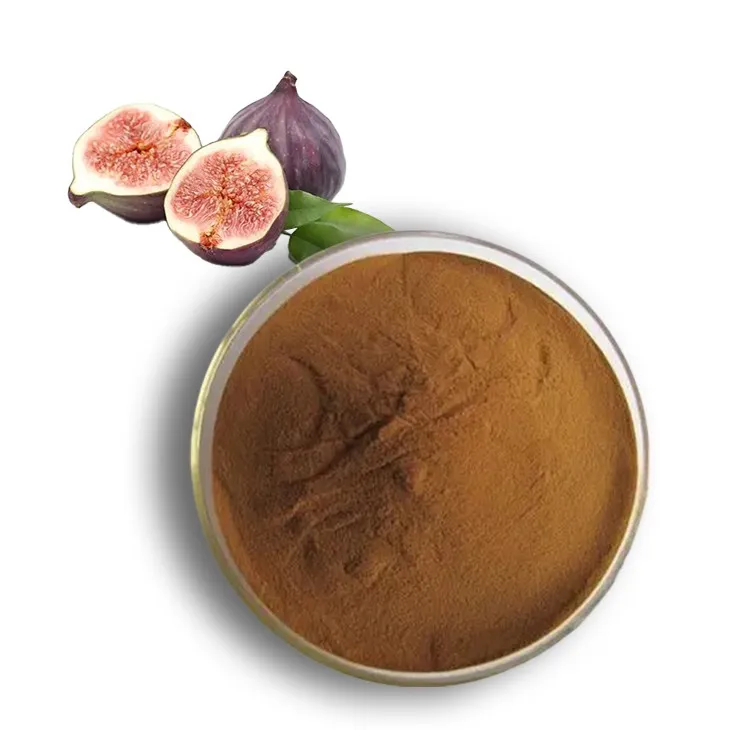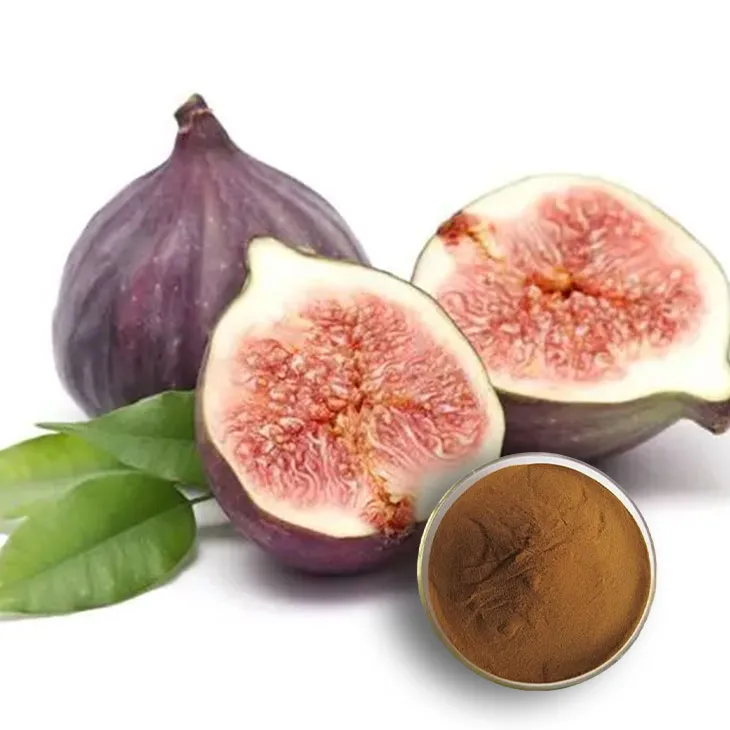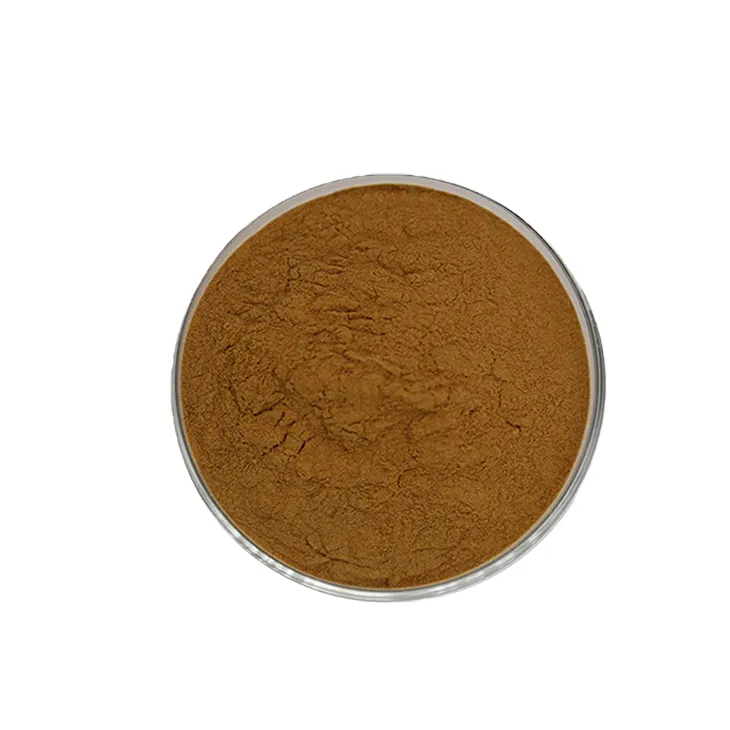- 0086-571-85302990
- sales@greenskybio.com
Application of Fig Extract in Skin Care.
2024-11-13

1. Introduction
In recent years, the beauty industry has been constantly exploring natural ingredients for skin care. Among them, Fig Extract has emerged as a promising candidate. Figs, which are rich in various nutrients, have a long history of use in traditional medicine for their health - promoting properties. The translation of these benefits to the field of skin care has led to an increased focus on Fig Extract.

2. Composition of Fig Extract
Fig extract is composed of a variety of bioactive compounds that contribute to its skin - care properties.
2.1 Vitamins
Figs contain vitamins such as vitamin C, which is well - known for its antioxidant properties. Vitamin C can neutralize free radicals in the skin, preventing oxidative damage that can lead to premature aging. It also plays a role in collagen synthesis, which is essential for maintaining the skin's elasticity and firmness.
2.2 Minerals
Elements like potassium and magnesium are present in fig extract. Potassium helps in maintaining the skin's hydration balance, while magnesium is involved in various enzymatic reactions in the skin cells, which are crucial for cell function and repair.
2.3 Polyphenols
Figs are rich in polyphenols, including flavonoids. These polyphenols are powerful antioxidants that can scavenge free radicals more effectively than some synthetic antioxidants. They also have anti - inflammatory properties, which can soothe irritated skin.

3. Benefits of Fig Extract in Skin Care
The diverse components of fig extract confer multiple benefits to the skin.
3.1 Anti - aging Effects
Free radicals are constantly generated in the skin due to environmental factors such as UV radiation and pollution. These free radicals can damage the skin's cells, including collagen and elastin fibers, leading to wrinkles and sagging skin. The antioxidants in fig extract, such as vitamin C and polyphenols, can neutralize these free radicals, reducing the signs of aging.
Moreover, as mentioned earlier, vitamin C promotes collagen synthesis. By enhancing collagen production, fig extract can help to keep the skin firm and smooth, reducing the appearance of fine lines and wrinkles over time.
3.2 Anti - inflammatory Properties
Skin irritation can be caused by various factors, including allergens, harsh chemicals in skin products, or environmental stressors. The polyphenols in fig extract have anti - inflammatory effects. They can reduce redness, swelling, and discomfort associated with irritated skin.
This makes fig extract suitable for those with sensitive skin or skin conditions such as eczema or rosacea. It can be used in formulations to soothe and calm the skin, providing relief from inflammation.
3.3 Moisture - retaining Capacity
The presence of potassium in fig extract helps the skin to retain moisture. Adequate skin hydration is crucial for maintaining a healthy skin barrier. A well - hydrated skin looks plump and radiant, and is less prone to dryness, flakiness, and cracking.
Fig extract can also improve the skin's natural moisture - retaining mechanisms. By enhancing the function of the skin's lipid barrier, it helps to prevent water loss from the skin, keeping it moisturized for a longer period.

4. Application Forms of Fig Extract in Skin Care Products
Fig extract can be incorporated into a variety of skin care products in different forms.
4.1 Creams and Lotions
In creams and lotions, fig extract can be added as an active ingredient. These products are designed to provide moisture and nourishment to the skin. The fig extract can enhance the anti - aging and anti - inflammatory properties of the creams and lotions, while also improving their moisturizing effects.
4.2 Serums
Serums are concentrated formulations that are often used to target specific skin concerns. Fig extract - based serums can be developed to deliver a high dose of antioxidants to the skin. These serums can penetrate deep into the skin layers, providing intensive treatment for anti - aging and skin repair.
4.3 Masks
Face masks are a popular skin care product for providing intensive treatment. Fig extract can be used in sheet masks or clay masks. In sheet masks, it can infuse the skin with its beneficial compounds, while in clay masks, it can combine with the purifying properties of the clay to soothe and rejuvenate the skin.
5. Clinical Studies and Research on Fig Extract in Skin Care
There has been a growing body of research on the efficacy of fig extract in skin care.
5.1 In - vitro Studies
In - vitro studies have shown that fig extract has strong antioxidant activity. These studies involve testing the extract on cell cultures or isolated enzymes in a laboratory setting. The results indicate that the polyphenols in fig extract can effectively scavenge free radicals, protecting skin cells from oxidative damage.
5.2 In - vivo Studies
In - vivo studies, which are conducted on human subjects, have also provided evidence of the benefits of fig extract. For example, some studies have shown that using fig - extract - based skin care products for a certain period can lead to a reduction in skin inflammation, improvement in skin hydration, and a decrease in the appearance of fine lines and wrinkles.
However, more comprehensive and long - term clinical studies are still needed to fully understand the potential of fig extract in skin care and to establish optimal usage conditions.
6. Considerations for Using Fig Extract - based Skin Care Products
While fig extract offers many potential benefits for skin care, there are some considerations when using products containing this ingredient.
6.1 Allergic Reactions
Although fig extract is generally considered safe, some individuals may be allergic to figs or components within the extract. It is important to perform a patch test before using a new fig - extract - based product. Apply a small amount of the product to a small area of skin, such as the inner forearm, and wait for 24 - 48 hours to check for any signs of redness, itching, or swelling.
6.2 Product Quality
The quality of fig - extract - based skin care products can vary. It is essential to choose products from reliable brands that use high - quality fig extract and follow good manufacturing practices. Low - quality products may not contain the effective amount of fig extract or may be contaminated, which could reduce the efficacy and even pose risks to the skin.
7. Conclusion
In conclusion, fig extract has shown great potential in the field of skin care. Its composition, which includes vitamins, minerals, and polyphenols, endows it with anti - aging, anti - inflammatory, and moisture - retaining properties. It can be incorporated into various skin care products such as creams, serums, and masks. While more research is needed to fully explore its potential, current evidence suggests that fig extract is a valuable ingredient for those seeking natural and effective skin care solutions. However, users should also be cautious about potential allergic reactions and ensure the quality of the products they use.
FAQ:
Q1: What are the main components in fig extract that are beneficial for skin care?
Fig extract contains various components such as vitamins (like vitamin C and E), minerals, and antioxidants. The antioxidants, for example, are crucial in combating free radicals. These free - radical - fighting properties help to prevent premature skin aging, which can be caused by environmental factors like pollution and UV radiation. Minerals can also contribute to maintaining the skin's overall health and balance.
Q2: How does fig extract reduce skin irritation?
Fig extract has anti - inflammatory properties. It can soothe the skin by reducing inflammation at a cellular level. When the skin is exposed to irritants, it often becomes inflamed. The components in fig extract interact with the skin cells to calm this inflammatory response, thus reducing irritation and making the skin feel more comfortable.
Q3: Can fig extract be used for all skin types?
Generally, fig extract can be suitable for most skin types. For dry skin, its moisture - retaining capacity is very beneficial as it helps to keep the skin hydrated. For oily skin, it can help in reducing inflammation and maintaining a balanced skin condition. However, those with very sensitive skin should do a patch test first, as although it has anti - irritation properties, individual sensitivities can still vary.
Q4: How is fig extract incorporated into skin care products?
Fig extract can be incorporated into various skin care products in different ways. It can be added during the formulation process of creams, lotions, and serums. Manufacturers may use different extraction methods to obtain the active components and then blend them into the product base at appropriate concentrations. For example, it can be in the form of a concentrated fig extract solution that is mixed with other ingredients like emollients and preservatives to create a finished skin care product.
Q5: Are there any side effects of using skin care products with fig extract?
While fig extract is generally considered safe for use in skin care, some individuals may experience minor side effects. As mentioned before, those with very sensitive skin might have an allergic reaction, although this is rare. In some cases, if the product is not formulated correctly or if there is an over - use of products containing fig extract, it could potentially lead to skin congestion or breakouts. However, when used as directed and in products that are well - formulated, the risk of side effects is minimal.
Related literature
- The Role of Natural Extracts in Skin Care: A Focus on Fig Extract"
- "Beneficial Effects of Fig - Derived Compounds in Cosmetic Dermatology"
- "Fig Extract: A Promising Ingredient for Skin Health and Beauty"
- ▶ Hesperidin
- ▶ citrus bioflavonoids
- ▶ plant extract
- ▶ lycopene
- ▶ Diosmin
- ▶ Grape seed extract
- ▶ Sea buckthorn Juice Powder
- ▶ Beetroot powder
- ▶ Hops Extract
- ▶ Artichoke Extract
- ▶ Reishi mushroom extract
- ▶ Astaxanthin
- ▶ Green Tea Extract
- ▶ Curcumin Extract
- ▶ Horse Chestnut Extract
- ▶ Other Problems
- ▶ Boswellia Serrata Extract
- ▶ Resveratrol Extract
- ▶ Marigold Extract
- ▶ Grape Leaf Extract
- ▶ blog3
-
High purity olive leaf extract
2024-11-13
-
Lavender oil extraction method
2024-11-13
-
100% organic virgin sea buckthorn fruit oil
2024-11-13
-
Lotus leaf extract powder factory in China
2024-11-13
-
China aged garlic extract supplier
2024-11-13
-
Deer antler extract powder manufacturer
2024-11-13
-
Saw palmetto extract vs whole herb
2024-11-13
-
Black Pepper Extract
2024-11-13
-
Peppermint Extract Powder
2024-11-13
-
Mulberry leaf Extract
2024-11-13
-
Oyster Mushroom Extract Powder
2024-11-13
-
Curcuma Longa Extract
2024-11-13
-
Dandelion Leaf Extract
2024-11-13
-
Chaste Berry Extract
2024-11-13
-
Milk Thistle Extract
2024-11-13
-
Lemon Juice Powder
2024-11-13
-
Bayberry Extract
2024-11-13





















